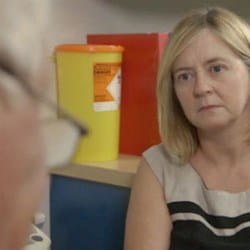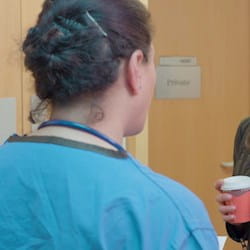Mr D, the husband of a young mother with two children - both with chickenpox - phoned the family GP out-of-hours service early one morning. He reported that his wife had developed a rash in her mouth in addition to severe back pain such that she found it difficult to walk. She had reported a fall a few days previous.
A home visit was arranged and the out-of-hours GP diagnosed chickenpox and an unrelated 'bad back'. He advised that Mrs D take Nurofen and apply a hot water bottle to ease the pain, and to see her GP in the morning if not better. But a few hours later Mr D phoned the service again to say the rash and back pain had worsened. He was told to persist with the advice provided by the emergency GP and his request for another home visit was refused.
During the day Mrs D's condition further worsened and her husband took her to the local A&E. She was given more analgesics and again advised to see her GP the next morning. That next afternoon Mr D phoned the GP surgery and told the receptionist that his wife could not attend the surgery as she was unable to walk with the pain. The receptionist replied that as the practice was so busy the best she could do was have health visitor return his call.
Mrs D was provided further pain relief but a day later developed a cough which worsened overnight. More calls to the surgery and deputising service resulted in additional advice to buy a cough medication and Bonjela for the oral lesions. Mr D later found his wife collapsed in the bathroom and phoned for an ambulance.
Chicken pox varicella pneumonitis was diagnosed and the patient's condition deteriorated in hospital with eventual respiratory failure. She developed a tension pneumothorax and suffered a cardiac arrest from which she did not recover.
Analysis and outcome
A negligence claim was lodged on behalf of Mr D by his solicitors. Doctors both from the practice and the out-of-hours service were named. Expert opinion in the case concluded that the fact Mrs D had suffered a fall which could have resulted in back pain clearly masked the early symptoms of developing pneumonitis. There was also some dispute as to whether any of the doctors had been made aware that Mrs D had developed a cough and other respiratory symptoms. Export medical opinion also question whether earlier treatment at the stage when the cough was first reported would have significantly changed the outcome in the case.
In the end it was judged prudent to settle the case on behalf of the MDDUS member involved.
Key points
- GPs should take full histories from patients, particularly when speaking to them on the telephone.
- Symptoms should be sought and recorded.
- Repeated requests for medical advice over a short period of time should raise a high level of suspicion, resulting in a ready willingness to make a home visit.
This page was correct at the time of publication. Any guidance is intended as general guidance for members only. If you are a member and need specific advice relating to your own circumstances, please contact one of our advisers.
Save this article
Save this article to a list of favourite articles which members can access in their account.
Save to library


